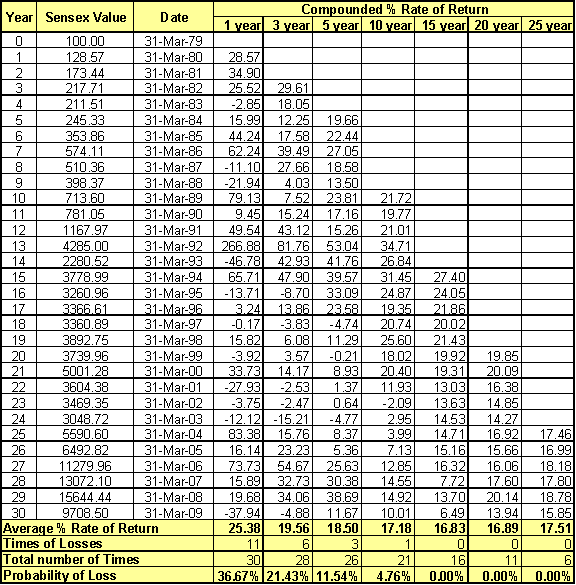Time is money, is a one-liner that says it all when it comes to investing in stocks! Timing your investment is extremely crucial. But, does it really matter in the long run? What is the return that you can expect to make by investing in stocks over 1 year, 3 years, 5 years or 10 and more years?
In terms of investment ‘time’ perspective, in the short run the performance of equity shares is driven more by market sentiment than by company fundamentals. The correct time perspective for investment in stocks would be one that allows you as an investor to participate in and benefit from company’s growth. Keeping this in mind the ideal period to stay invested should preferably be greater than 5 years.
One would learn that in the long run, the relevance of the right price diminishes. If you choose the right company and have the right time perspective, in the longer term, it does not really matter too much whether you bought the share at the lowest price or not. This is because as long as the company is growing and you hold on to your investment, the Power of Compounding will multiply the value of your investment at a rate that will make the initial investment price insignificant. This makes a real mantra for wealth creation.
Taking the longer term perspective of staying invested for a period of 10 years and or more, you can expect stocks to yield returns ranging between 15% and 20% annually.
As unbelievable it may sound, an overview of the performance of Stock Markets over last three decades (see table below) confirms the same.
Historic Performance : Returns generated by Sensex over last 30 years

The table also shows the relationship between the period of investment and chances of loss. For instance, had you invested in the Sensex for any one year between 1979 and 2009, in 11 out of 30 times you would have lost money. However, if you would have stayed invested for more than 10 years your chances of loss would be almost zero. That too making a handsome average return of around 17% annually!
Conclusion
You may argue that this is historic performance of Sensex and it can not be taken as a measure to predict the future performance. Agreed, although future performance is not always dependent on the past performance, but there is no denying that it provides a track record of Stock Market performance over last 30 years. We can clearly see that as the time of investment holding increases the risk becomes lower and returns are higher than most of ‘safe’ investment avenues.


Manish,
I totally agree with the points you mentioned here… If one has some money to be kept aside for some longer period say, 5-6 years… Stocks is the best option, as the probability of making losses drops over longer periods…